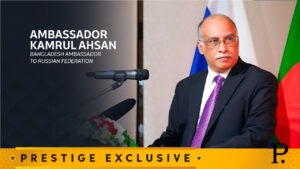Q. What has been your career journey like? Give us a short background of it.
I started my career in the US, where I grew up. I started in a management consultancy but I wanted to go overseas and work in developing countries. I came back to Bangladesh to work with a UK based NGO on water and sanitation. The idea was to create social businesses, in an urban setting, working with municipalities and the private sector. From there, I ended up running an accelerator program that works with and trains social entrepreneurs around Bangladesh. I saw two limitations. One, it’s not enough to train people because you also need to provide capital if you want them to succeed. There was and still are not enough platforms to provide risk capital to entrepreneurs. Second, there’s quite a lot of grants going towards supporting the entrepreneurs but those are mostly from foreign organizations. But I felt that the best way to change the country is when successful Bangladeshis invest in Bangladeshis. Based on these 2 observations I started learning more about angel investing, the concept of angel networks and how they organize angel investing.
I was quite lucky that I got a few mentors who were also prominent investors in the startup ecosystem, who also wanted to do the same thing. They were looking to create an angel network and were looking for a CEO, which resulted in us joining forces and starting BD Angels. Since then I have been the CEO of BD Angels for the last 2 years.
Although my educational background was in liberal arts and I started my career in management consulting which involved a little bit of financial knowledge, I had no academic background in finance or investing. I did work with an investment firm in Mongolia before coming back to Bangladesh which helped me to study and develop business cases, learn basic modeling, structure terms, etc. My skills were more focused on communication, connecting people and building processes which helped me to be the CEO of BD Angels.
Q. Tell us about Bangladesh Angels and with what vision it has been formed?
The vision was always to make it easier for aspiring entrepreneurs, to be able to go out and raise funding specifically for smart capitals for the startups. It usually starts up with potential friends, family or personal savings. Money itself is a very important game. It’s quite difficult, even though it’s getting easier with time for investors to be willing to buy your vision.
To exactly know about the places or people and the ways to approach them requires communication. We have to talk to people directly and it becomes very time intensive. Thus, we want to make that as easy as possible and seamless for entrepreneurs. Because when they go through us, they get the benefits of our accumulated experience, not just among the deals that we have done but being involved with the board level. Additionally, they are getting connected to mentors right away to be able to develop their model. We also help them with their fundraising plan. And when they present to a network, they are able to talk to many potential investors at a time.
Q. What does the start-up scenario currently look like in Bangladesh?
There are mainly three kinds of trends in the last 6 or 7 years. There are different types of mechanisms around start-up support. And there is a subculture in Bangladesh between entrepreneurship and wanting to be a startup founder. It’s a good thing since people should aspire to become entrepreneurs and founders. In Bangladesh, jobs are scarce. Sometimes one has to create the company that one wants to work for.
Secondly, the government support has been incredible. Many of the traditional financial institutions have also taken license to start their own thing. That came through because of the government policy. These are all important support mechanisms from the government side. There is also around 300 million dollars invested in Bangladesh for 6 or 7 years. Going into 2021, we would just continue the momentum.
There are a lot more foreign interests in our Bangladeshi startups. Not only that, we have to look at the consumer side as well. The amount of funding won’t matter if there isn’t any consumer to adopt the solutions. We believe that Bangladesh is a great economy that is digitizing rapidly and that is offering opportunities for different types of digital enabled services. I think so far it’s playing out, but we have a long way to go.
Q. According to you, which sectors have the highest potential for investment?
There are many and I think that’s the beauty of Bangladesh. If we look at the natural economy of Bangladesh, there are many digital gaps, when it comes to GDP. There is a large informal, analog based economy. For example, there are billions of people living abroad who are sending money to Bangladesh. It’s a difficult and expensive process. It is a hassle for freelancers here, who are struggling to get paid on time. So, that’s one of the challenges. Moreover, there are several unicorns in India on education notes. Similar curriculum exists in Bangladesh as well as the testing mechanisms and cultural habits.
We have an idea of how much middle class families are willing to spend on private tuitions or the quality of education. But we are yet to have a company in Bangladesh which is tech based that has raised more than a few hundred thousand dollars. We also have to look at the fact that billions of dollars of money is taken out every year from the country. Another challenge is how we don’t have a lot of skilled or educated people. There are not enough companies related to Agrytech and food processing compared to India despite the fact that this place employs 40% of the population.
Overall, there is a productivity gap between what we are doing and what more can be achieved. A few truck marketplaces and logistics companies are available. Gaming is also one of the interesting ones, we have consumers who are looking for content and it is not just limited to Bangladeshi consumers but extends to Bengali speaking consumers as well. I think there is a great world class design talent, for example Shilpokola, if we can combine it with a low cost developer base, then great content can be created for the gaming sector. I think that’s quite interesting since it is connected to international consumers. Additionally, microfinance is a huge niche in Bangladesh with billions of dollars.
Garment value chain started up but there is space for more achievement. This is now the biggest part of the economy. Also, as Bangladesh becomes wealthier, people’s habits are bound to change as well. In this way, healthcare is only going to grow big. That creates opportunities and even internal travel has been increasing these days. There are also billions of dollars spent on medical and general tourism. This seems very promising for the long run.

Q. Do you think there is any sector where the demand for investment is particularly decreasing?
I don’t think there is any particular sector with a decrease in investment. There are a lot of sectors in Bangladesh which are informal and analogue. So, digitizing that will be one of the challenges. I still believe that e-commerce is going to be a huge opportunity. Nowadays, there is less of an interest to finance e-commerce companies because there are just so many. According to me, that is one of the sectors that has less demand from an investment perspective.
Q. According to you, what are the strengths of Bangladeshi start-ups?
To compare with other countries, we can actually do a lot pretty quickly. It is a densely populated economy and people appreciate quality and a good product. Moreover, I do think Bangladesh is open minded as consumers and that’s important. We can also go a long way if we keep our capital right. There are many engineers and great talent in the country. Even whenever Bangladeshis go abroad, they tend to do very well, probably because they possess an inherent work ethic.
Q. What do you look for in a startup when you evaluate it?
I look at the problems they are solving, whether or not they are attractive. We evaluate whether the problems they are solving are growing, urgent or expensive. We also check if the founders have properly thought of the solution and made a sustainable roadmap down the line, whether the consumer would keep coming back to use the solution over and over again. We also look at certain unfair advantages like network effects, economies of scale, brand, intellectual property and other elements that help the company to succeed quickly. Ultimately, it comes down to the founder, how they have thought about the solution, recruiting, branding. I particularly love those sessions where I can learn a lot from the founder about a market or business. Those are the founders you should back because they are hungry for information and knowledge.
Q. How is gender equality being addressed among entrepreneurs and start-ups? Are there any preferences based on gender in terms of providing funding/investment?
The last of a couple of deals that we have done have been loved by women founders. We always want to encourage women. There are many women leaders in business now, who are directors in companies and they are in place to nurture, mentor and even invest. So, this year, I want to create a women’s network within Bangladesh Angels that allows for female founders and female angels too to find each other more efficiently. We have decided to support and work with a lot of female founders.
Q. Since, Bangladesh Angels is providing investment support to its partners, can we call it like an unofficial VC firm or we would love to know about the modality of business? What should we refer to as, is it a kind of Venture capital firm or is there more to it?
We are not a VC, we are actually a hybrid of a member based organization. We help passionate people think about startups. Secondly, we provide advice regarding startups and fundraising. We help them think about how to raise money. We also help them get investors, manage those discussions and even do the documentation. Moreover, facilitate those negotiations, the structure of the documents behind those things. We are not a venture firm because VC manages money on behalf of other people. We never touch the invested money. Not on behalf of our angels or our founders.

Q. What legal obstacles do you face while operating in Bangladesh and what steps have you taken to solve them?
We would like to do more in advocacy going in this year. Globally speaking, angel investing works through instruments that are more founder friendly. Some of the things are quite hard in Bangladesh because we have to do price rounds, we can only invest equity. So this becomes a challenge in making things easier. In Bangladesh, if a startup takes in 100 people, it becomes very hard to manage from a communication and legal standpoint because we have to take a lot of signatures and approvals. So ideally, all these small investors should be part of one company. Then, they can take shares in the target company on their behalf. This is commonly seen abroad but in Bangladesh, it gets harder because we get taxed in companies, Investment companies and more. I think all these challenges will change over time and people like me and others in the ecosystem need to advocate. One thing that I have noticed is that, as long as we show policy makers a path, many things are bound to happen.
Q. What changes might we see in the start-up ecosystem due to this COVID 19?
I am hopeful about 2021. Funding has increased a lot compared to the past years and a lot of that funding is coming from abroad. Foreign investors, foreign angels and foreign VCs are interested in Bangladesh. So, I think this is only going to continue. Once people have seen the growth and Bangladesh, it elevates the reputation of Bangladesh among investors around the world. We should just continue telling those stories, go to these places and tell people about Bangladesh. I also think we should take proactive measures to create those linkages.
Q. What type of investment pitches have you received during this pandemic which you have found to be promising?
Yes, Kludio is one of them. It is one of the first cloud kitchens in the country. So, when the pandemic hit, we moved a lot towards eating at home and they were able to take advantage of that. We invested even in healthcare before the pandemic, they provided teleconsultations between the doctors in the network and patients. They are then taking a cut of the transaction cost. We are competing with a lot of global platforms as well. That’s also a challenge. Habits of consumers have changed and that allows the startups to flourish with their value proposition.
Q. What suggestions would you give to entrepreneurs to improve their business in the long run?
One is to be mindful although fundraising is getting easier, it is still very difficult and not a sure shot. So one has to be mindful about the ways of spending money. There are many ways to test your ideas about the correct ways of utilizing the capital. I like founders who do that, founders who show capital efficiency. This just shows that they can go far. Founders should also be careful about their relationship with their customers. A lot of time should be spent with the customers, communicating with them or even testing ideas with them and figuring out how to sell to them. It starts at the founder level because one can’t just outsource that to the team. So, founders who have a good idea and are passionate about sales, go a long way as well. Lastly, it is important to think about the skills needed in a team. If certain skills are missing, one needs to augment those skills, it can be done by bringing investors, advisors or even potential angels in. Raising money isn’t just about the capital, it is also about being the right capital with the right advice.
Q. As a developing country, how can Bangladesh tackle the brain drain situation?
First of all, it would be the quality of life. Dhaka itself is a difficult city to live in, given its lack of infrastructure. The next is, those that desire a higher income, which is natural, particularly if he/she is talented, would want to go abroad and earn it. The third would be recognition. There are certain industries/companies that are not in Bangladesh or are not yet large enough that draw ambitious young people. These are probably the three main reasons I feel why brain drain is still an issue in Bangladesh.
My colleagues and mentors in the startup ecosystem like Rahat Ahmed, Bijon Islam, Minhaz Anwar – they talk about the brain drain issue all the time. There’s nothing inherently wrong with Bangladeshis when it comes to talent and work ethic. In fact, when you go around and meet foreigners who work with Bangladeshis, they would say that Bangladeshis are hard working, talented and humble. Bangladeshis also have the tendency to do well when they go abroad – there are 1000’s working in the technology sector in North America, for example. So, the question arises about how we can create opportunities within Bangladesh to utilize those talents and build companies that they would like to work for, within our physical borders.
I think the opportunity in the startup sector is massive and there is no shortage of talent in Bangladesh to help grow it. The beauty of the digital age is that you can create anything today and reach a global audience through the internet almost instantly. I would like to help create globally competitive companies to attract the talents within our country who aspire to go abroad and generate globally competitive incomes and recognition for them. All else being equal, talented people should want to stay in this country given the fact that their roots and families are here, if they had the opportunities.
Q. What projects are you involved in apart from BD Angels?
BD Angels Network (BAN) is my baby. It’s what I think about and work on when I’m not sleeping or with family, and sometimes even then.
Q. Where do you see Bangladesh Angels in the next 5 years?
I would love to be at a point where we are not just active in Bangladesh but in multiple countries. We want to be a bridge between NRB’s and Bangladesh and vice versa. I want us to be able to scale the work we are doing through a fun model in the future. Moreover, I also want us to be an educational platform, where an angel investor or a founder can go to our website and learn about angel investing by themselves. It’s not going to be high level information, it’s going to be specific insights related to case studies in Bangladesh. I want us to make it easier to invest, it could be from standardized documentation as well as lowering the threshold for investing.
Q. What notable investment Bangladesh Angels have made till now?
Jantrik has been a good experience for us. It has done very well in the automobile services. We recently did Nitex, they are trying to digitize how to chain, people are lining up these opportunities to get connected and switch from Bangladesh. I also like the healthcare line, Doctorkoi, they really know how to monetize solutions for the doctors and doctor’s chambers. So they can go very far with the network that they have built.
Q. What helps or motivates you to thrive and achieve your target?
The vision for me is clear: We want to make it easier for a young person in Bangladesh to be able to create world changing companies. I believe that’s fully possible within Bangladesh and I want to help the founders to obtain angel funds, early stage investing and advice. Beyond that, we are working hard as a team of 6 who work with me, trying to create our own needs and KPIs and holding each other accountable to make sure we reach our goals. We make bigger goals into smaller ones and work on them accordingly. Whether we fail or win, we always try to find the reasons and make improvements where necessary.
Q. What’s your personal vision/goal for the next few years? Do you plan on launching a startup yourself?
The beauty of something like BAN is that it can really evolve and doesn’t have to be just an angel network. This is our 3rd year and we are thinking of 3 or 4 years down the line on how the company is going to evolve. I think one element is automation. We want more entrepreneurs and angels to come to our platform and teach themselves about investing, networking with each other, etc. We are doing this manually right now and we want to automate the process and make it more efficient.
In the long run, I want to create world changing institutions in Bangladesh which would allow the country to go from a middle income country to a higher one. I hope I can contribute to Bangladeshis making knowledge-based solutions all over the world. There can be different types of roles that can be played in that, maybe as an investor or an advisor and even as a founder. I envision myself doing all three in the next few decades.
But I think at this stage of my career, I can add the most value to the ecosystem and the country through supporting other startups and helping them to grow. Right now, the best way I can contribute to this country is by building a strong network of angels and investments, and connecting entrepreneurs and angels as effectively as possible.






